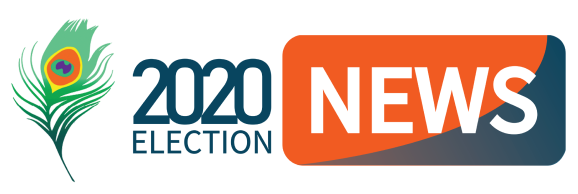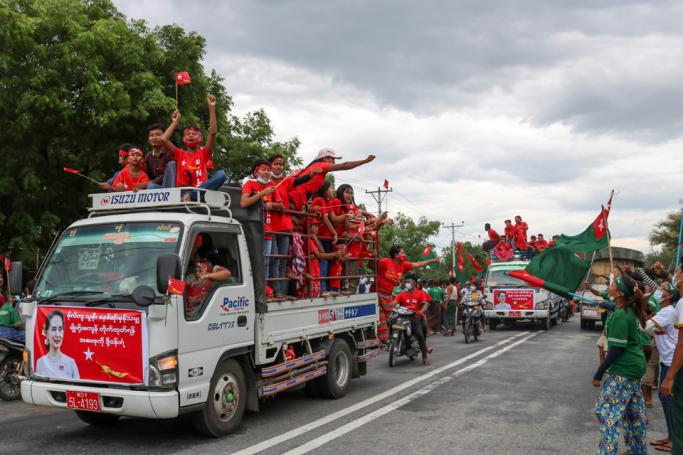COVID-19 has already cast a darkening shadow of gloom over Myanmar’s November election. A second wave of sars2-corona virus-19 has engulfed Yangon and over 330 townships nationwide. From a once comfortable position of only 374 confirmed cases on August 16, confirmed cases have now skyrocketed to 26,064 and 598 dead recorded just over seven weeks, as this magazine went to press.
The death toll is steadily rising, medical authorities are struggling to cope with around 1,000 a day new cases and health experts say Myanmar’s public health system is now at breaking point.
For a great many voters their paramount concern is staying safe, and avoiding any exposure to the virus, outpacing interest in the November election. But it is also undeniable that there are millions of die-hard Aung San Suu Kyi followers who believe they must win the election for “Mother Suu “regardless of any other issue. They are expected to faithfully show up at polling stations whatever the risk of the virus spreading further.
It is no surprise that 24 opposition parties have called for a postponement, but so far the Union Election Commission (UEC) have dismissed the proposition and the ruling National League for Democracy has also dismissed it out of hand.
Level playing field for the NLD and ethnic opposition?
UEC guidelines and the enforcement of a lockdown in Yangon have crippled the public campaign with most of the lobbying now diverted to social media channels. An election that has been stripped of most of the colour, public involvement and fanfare, is mostly confined to Facebook and other online venues in which the well-funded big parties NLD and USDP have a commanding advantage over the smaller parties.
Can it be a free and fair election if the spirit of campaigning is so stifled by social distancing regulations, and restrictions on canvassing and public rallies? In this pandemic-constricted election, the NLD is widely seen as the big winner.
In Chin State human rights activist Cheery Zahau, aligned with the opposition ethnic-based Chin National League for Democracy (CNLD), told Mizzima: “The ruling government NLD has an upper hand because they can continue their government activities as part of their election campaign. They also use COVID-19 economic recovery funds to support NLD voters and potential voters.”
As of June the Ministry of Finance announced Myanmar would receive up to $2 billion in international aid for CERP or the Covid Economic Recovery Plan, according to local media reports.
This accusation of misuse of funds is denied by the NLD party. However, questions about how the billions in aid for the COVID-19 economic recovery package is distributed by the NLD government have been exposed by a civil society report that claims the COVID-19 recovery funds lack transparency and proper auditing.
Winner of the 2018 Schuman Human Rights Award in 2015, Cheery Zahau ran for the 2015 election but lost to an NLD candidate. In this election her husband is running as a candidate for the CNLD.
In some ethnic states Covid-19 UEC guidelines have been skewed to only apply to the campaign of party rivals, Cheery Zahau alleges.
“They restrict campaign activities for opposition parties, for example in some villages, the village authorities who are NLD members or hard-core supporters do not allow other parties to conduct public meetings or speeches by using the COVID 19 restrictions order,” she told Mizzima.
NLD party cadres have also complained that in Mon State in areas where village officials are adherents of the Mon SPP, they have also been stopped from campaigning on the alleged pretext of COVID-19 restrictions.
“Opposition parties are also worried about the accuracy of voters lists. According to Cheery Zahau: “The ruling party has much more leverage in terms of finance resources and administrative power. We are very concerned that there might irregularities with the voter list. Right now, there is duplication of names in the list. And many who cannot return to their home villages and towns due to COVID 19 travel restrictions.”
Is postponement still a possibility?
The last few weeks Myanmar’s infection rates and fatalities have soared. Dr Zaw Wai Soe Vice-Chair of the Yangon Region Coordination on COVID-19 Prevention, Control and Treatment Committee has described their mission as “waging a war on COVID-19” while others have warned of public health services in danger of being overwhelmed.
The prime cause of this “second wave” gripping Yangon is still unknown, according to Dr Zaw Wai Soe.
By September 28, only a handful of countries had higher case positivity rates than Myanmar – Iraq, Tunisia, Mexico and a few nations in Central and South America, including Brazil, Colombia and Argentina.
In spite of the worsening COVID-19 crisis, neither the UEC nor the NLD have wavered in their dogged refusal to consider the arguments in favour of a postponement. No debate has taken place on the merits, disadvantages and contingencies of a possible postponement. This leaves Myanmar will no Plan B, if the lack of control of a surging COVID-19 could still abort the election in the final weeks.
If Myanmar were to postpone, it would not be alone. Many countries have already postponed elections or national plebiscites in 2020 including New Zealand, Switzerland, Ethiopia, France, Italy, Spain, Switzerland and Romania, and the UK when it came to local elections. However, South Korea has showed with its parliamentary election on April 15 that it can be safe for voters, but only if very high standards of careful planning and strict precautions are in place. This involved temperature checks on all voters, protective gear for polling-station workers and separate stations outside of hospitals for the infected.
Myanmar’s facilities?
But Myanmar is far from being in the same league of preparedness as COVID-19 control in South Korea with its well-funded public health system that contained the virus by using comprehensive testing and tracing.
South Korea was past the peak of its outbreak by April 15 when the election took place. But there is no indication from the latest WHO figures confirmed cases and death figures for Myanmar that the country is even close to a peak
In Myanmar, UEC measures for polling day have included: increasing the number of polling stations 40,000-50,000 to provide a degree of social distancing, staff wearing personal protective gear while voters will be instructed to wash their hands before casting a ballot, may help to reduce potential infection but falls far short of the South Korea’s comprehensive regime of PPE.
Sri Lanka, with a socio-economic profile much closer to that of Myanmar, significantly postponed elections twice because of COVID-19. Eventually with additional COVID-19 safeguards in place, a general election was finally held in August. Two in three of all countries scheduled to hold elections in 2020 have decided to postpone them.
The Myanmar government and the UEC have tended to be dismissive of the mounting calls from the opposition for a postponement. However, the NLD finally provided some explanation to local media on September 17. NLD spokesman Myo Nyunt explained: "Postponing the election when it is uncertain how the situation might develop in the future, will simply result in more problems including a political crisis on top of the current public health and economic problems."
A legal observer has clarified that no political crisis would arise as long as the delay is for around six weeks, and the election takes place before January 31.
The 2008 Constitution expects a new government to assume office in February, therefore allowing for a short postponement.
Myo Nyunt perhaps realizing this point then added: “Delaying the election by one and a half months won’t make the situation better. That’s why we believe we should hold the election if things are not getting worse.”
Since the NLD spokesman made is statement back in September, the figures of confirmed cases have doubled to 26,000 which appears to be clear that things are indeed getting worse.
State Counsellor Aung San Suu Kyi has stressed the importance of still going ahead with the election.
Tom Kramer a development consultant for the Dutch-based Transnational Institute commented that this runs counter to what the NLD said about the military regime pushing ahead with a vote on the constitution in 2008,
when the nation had just been devastated by Cyclone Nargis. In 2008 the NLD called on the military regime “to concentrate on humanitarian work and postpone the vote.”
Tom Kramer commented: “The 2008 referendum on the constitution took place in the aftermath of the Cyclone Nargis emergency. This is another reason why the approval process has never been viewed as free and fair. In the present emergency of COVID-19, it means that in a fragile democracy, this election can by no means be considered free and fair.”
Compared to the landslide victory for the NLD in 2015 election, the credibility of this election is already deeply-flawed according to a Human Rights Watch (HRW) report released on October 5.
Apart from all impacts of COVID-19 restrictions on campaigning, the HRW report claims the NLD government has blocked freedom of expression. One case cited: The Democratic Party for a New Society was banned from mentioning the controversial copper mine in Letpadaung and from referring to land rights issues. At least four parties have canceled their broadcasts on State TV after censorship of the content by the UEC.
A significant part of the population in ethnic states will be disenfranchised will the UEC admitting that that polling stations will be not set up in Rakhine, Kayin, Kachin, Shan and Chin States where the civil war continues owing to lack of security. Offers of a ceasefire from several EAOs (ethnic armed organisations) have not been acted on by the Tatmadaw. The vast majority of 430,000 internally displaced persons (IDP) forced out of their homes by fighting will have no opportunity to vote. Of these 130,000 are Rohingyas detained in IDP camps which have been subject since 2012 to discrimination and deprivation of human rights and denied citizenship.
Controversial election
This election is an important milestone as the second general election based on a multi-party system after the 2015 landslide victory for the NLD. But this COVID-19-contoured election is already shaping up to be controversial with its democratic credentials being heavily challenged.
Thant Myint-U, the author of The Hidden History of Burma, recently said in a tweet that the November election could be "deeply flawed," adding that it "won't help Myanmar address any of its big challenges: violent conflict, climate change, inequality and underdevelopment."
And even if the UEC COVID-19 protective measures are rigorously implemented at the polling stations, there is still a concern amongst some quarters about the wisdom of holding an election during the pandemic.
Is the Myanmar government in rejecting any proposal for a postponement acting on the basis of best medical advice, or acting primarily on the basis of political calculations and the best interests of the NLD party?
The State Counsellor is unshakeable in her determination to go ahead with election telling her supporters that the “election is more important for Myanmar's future than the fight against COVID-19.”
That statement might not be endorsed by many of the country’s public health experts. Dr Khin Khin Kyi, the director of the Emerging Infectious Diseases Epidemiology Unit asserted back in September that public health is more important than political campaigning especially with the health system in Yangon being stretched to its limits.
There is every indication that the NLD will emerge as the election winner, but whether the legacy of the 2020 plebiscite will also be a victory for democracy and the nation is increasingly in doubt. It may also make winning the war on the COVID-19 pandemic all the more difficult while leaving the legitimacy of a second term NLD government considerably eroded by the brutality of war that still plagues the nation.












